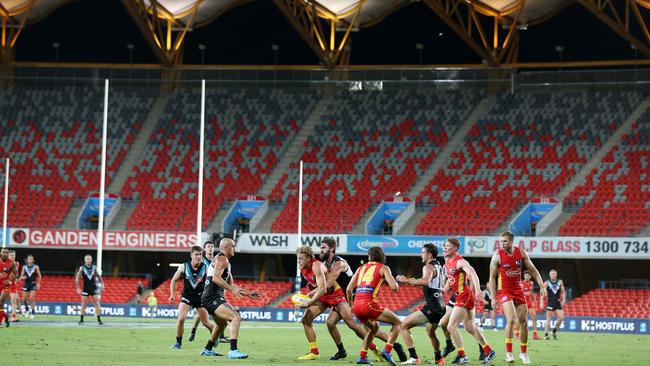States jockey for chance to host AFL hubs
A national framework being established for elite sports will guide the AFL’s planning on when and where footy will next be played.

A national framework being established for elite sports will guide the AFL’s planning on when and where football will next be played.
The improving health outlook in Australia has resulted in a reconsideration in the probable return date for the AFL from July to late June as states jockey for the opportunity to host one of the league’s proposed hubs.
Gold Coast Suns chief executive Mark Evans, who was previously the AFL’s football operations manager, said Queensland was a logical choice to host football on its resumption, as Prime Minister Scott Morrison confirmed guidelines related to professional leagues had been discussed by the National Cabinet.
Evans believes the tourism region is ideal for a hub given it meets accommodation requirements. He said the club had already begun planning to host games at Metricon Stadium on a regular basis.
“Initially, the planning was ‘How do we host individual games like we did in Round 1?’,” Evans said. “But we’ve already quickly turned to (the concept of) how we would host multiple games in multiple days and what we’d need to do to prepare the ground for that.
“I think it is a very, very strong chance (that southeast Queensland is used), but it will be subject to government and health authorities in Queensland and also the other states and what is available.”
The Lions’ home ground, the Gabba, serves as a second stadium, although Brisbane does not control operations there.
The warmer winter weather in July in Queensland could prove an advantage if clubs are forced into hubs, as appears likely.
“The season may take many phases from here, and the first one of those might be a hub system in winter, so this looks like a pretty good place to have one, from my point of view,” Evans said.
AFL chief executive Gillon McLachlan said all states were being considered as potential hub hosts. State coronavirus guidelines, the suitability of facilities, the ease of movement and accommodation options are among the factors being weighed up.
Greater Western Sydney chief executive Dave Matthews and Sydney Swans counterpart Tom Harley have made a strong case for the NSW capital to be considered. While there has been growing acceptance about the use of hubs, North Melbourne coach Rhyce Shaw said clubs had yet to have that confirmed.
The AFL will hold another competition-wide phone hook-up with clubs early next week after McLachlan said resumption plans may not be announced until May.
“They’re taking their time. They’re not making any rash decisions,” Shaw said.
“I think they’ll play it as they see it and when we do come back, we’ll be back for good. If it is a hub, whatever happens, we’ll be ready.”
In an assessment that will boost optimism at the AFL, Victoria’s chief health officer, Dr Brett Sutton, said the current outlook suggested a start in late June was worth considering.
His view came as Victoria announced an outbreak linked to a private psychiatric facility in inner-city Melbourne.
“There is a chance. The move is always to try to open things up if the epidemiology allows it,” Sutton said.
“We are clearly moving to lower and lower cases, week on week, so that’s a good sign, but today is a demonstration you can get explosive outbreaks.
“Sometimes these things spill into the community, so we have to be mindful these things could change in the wrong direction over the next month, but I would hope there are possibilities for a whole number of things to restart.”
Administrators at state, suburban and regional levels also hold hope of resuming their seasons.
Similar to the elite level, the closure has resulted in league administrations and football departments closed down indefinitely.
A prolonged shutdown is likely to place into peril the future of several clubs and, potentially, some competitions.




To join the conversation, please log in. Don't have an account? Register
Join the conversation, you are commenting as Logout